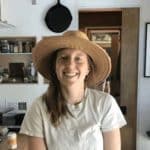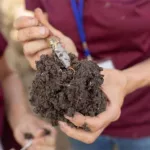Soil Health and Regenerative Farming
This two-week online program gets you up to speed on soil health and the critical role it plays in addressing climate change through regenerative agriculture.
Course level: Introductory
Taught by

Dr. Laney Siegner
Founder & Co-Director, Climate Farm School

Ryan Peterson
Co-Director, Climate Farm School
- 2 weeks / 4 hours per week
- 100% online
- 4 instructor- and farmer-led live sessions
- Class recordings available
- 2 active soil health projects
- Completion certificate
About this course
This course will introduce the five principles of soil health with illustrative, innovative examples of how farmers apply these principles and are incentivized and rewarded for their efforts. We will also discuss how soil carbon stocks can be used to engage in carbon markets and carbon offsets.
You will walk away from the course with a deep understanding of soil health principle applications and the complexities of scaling regenerative agriculture practices. You will also build a strong network of peers and leaders in the space.
Hear from course creator Dr. Laney Siegner
Who is this program for?
Ag tech professionals
Stand out in this field as someone with a farmer-educator network
Farm managers
Refine your operations to enhance soil health
Sustainability managers
Understand what it takes to inset emissions reductions through farms
Climate educators
Know where farm-based climate solutions fit into the larger mitigation puzzle
What climate skills you'll learn
Soil sampling
Measuring soil carbon using the CASH method
Building healthy soil
Practicing the five principles of soil health from soil armor to minimizing soil disturbance
Scaling regenerative agriculture
Understanding challenges and opportunities in this emerging holistic practice
Living your climate principles
Gardening while applying regenerative soil health principles and connecting to your local food system

event concluded
Soil Health Principle #1: Keep the Soil Covered
- Apr 16, 2024
- 9:00am-10:00am PT
The Terra.do difference
Live lab groups
Twice a week, you will meet with instructors to co-work on projects and share perspectives.
Skills-based learning
You will engage in individual real world assignments to immediately apply the skills you’ve learned.
Personalized attention
You will receive personalized feedback on your assignments.
Sync and async learning
Flexible learning options including offline learning materials and instructor-led live sessions.
Meet the course creators
Dr. Laney Siegner
Founder & Co-Director, Climate Farm School
Laney recently completed her Ph.D. at the UC Berkeley Energy and Resources Group. She researches sustainable agroecological food systems and climate change education and has completed several summers of sustainable agriculture work. She has published book chapters on teaching climate change in U.S. K-12 classrooms and on conducting participatory agroecology research. When she’s not teaching or learning, she enjoys being outside for a variety of physical activities – farming, worm composting, trail running, bird watching, and swimming in the ocean
Ryan Peterson
Co-Director, Climate Farm School
Ryan Peterson is dedicated to regenerating ecosystems through food and agriculture. After beginning his career in finance, he decided to change course and study sustainability at UC Berkeley where he was captivated by the potential of food systems transformation. His master’s research focused on how policy can be used to promote agroecology in California. He went on to train as a cook at Chez Panisse before helping to launch the Culinary and Food Systems Program at The Ecology Center, a regenerative farm and ecological education center in San Juan Capistrano, CA. He has worked on farms in Maine, Northern and Southern California, and Hawaii. He spends his time collaborating with farmers.
Course schedule
- Readings/viewings: NRCS documents on soil health principles; Carbon sequestration opportunities on regenerative farms
- Class 1.1 (Tue): Principles of soil health
- Class 1.2 (Thu): How soil health translates to regenerative agriculture
- End of week assignment: Personal example of soil health principles
- Readings/viewings: Analyses of and alternatives to carbon markets; Scaling regenerative agriculture
- Class 2.1 (Tue): Understanding and measuring soil carbon
- Class 2.2 (Thu): Supporting the transition to soil health and regenerative agriculture across the food supply chain
- End of week assignment: Create a soil health plan for a specific location
Pricing and expected commitment
Our fellows say it best...

Rebecca Babcock
“What I loved about this course was that while the focus was on farming in terms of producing food, I could apply the principles to my own context (creating native pollinator gardens in Ontario)! Of course, I have bigger dreams of a) spreading pollinator gardens outside of my own backyard, and b) possibly turning a plot of land into a regenerative farm.”

Olga Shavrina
“I loved the Soil Health and Regenerative Farming course. It was short but concentrated, and I've learned a ton! Most importantly, I understood that I can do so much myself using my own hands, knowledge, logic, and senses, by being humble and learning from nature. I discovered that there's so much more to learn and got a clear direction where to start.”
Hear from our community
Frequently asked questions
Future program dates will be announced soon.
People motivated to or already working in regenerative agriculture (such as ag tech professionals and farm managers) and climate (such as sustainability managers and climate educators), who are looking to develop advanced knowledge that they will apply in their professional and/or personal lives. Individuals who see this course as part of a learning journey will benefit most as there will be many opportunities for further learning.
Yes. There are no prerequisites required for this course and we welcome participants from all backgrounds and regions of the world to participate.
The Soil Health and Regenerative Farming course is a short online course that does not include a week spent on a farm, which is the defining feature of our hybrid in person and online Climate Farm School course. These two courses are complementary and contain their own unique content. Those looking for a deeper dive into regenerative agriculture as a climate solution would benefit from completing both courses.
Several organizations have learning or professional development budgets for their employees. We encourage you to enquire about and utilize this budget to attend the course. Terra.do will help you get reimbursed for the course by providing an invoice, a certificate, and any other documentation you need. If you have approval from your company, we can also arrange for your company to pay directly.
Attending or viewing the recordings of each live session and completing the final assignment are the requirements for receiving a certificate.
We expect to run more cohorts given ongoing demand for this course.
Financial aid is not available for this course.
If you have a question about this course that isn’t covered in the FAQ, please email us at soilhealth@terra.do.